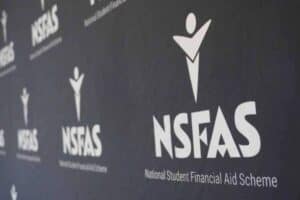Outa claims service providers stand to make about R1.5 billion from the five-year deal despite not having banking licences or the tax registration needed to make direct payments of student allowances.

Frustrated students have decried the new National Student Financial Aid Scheme’s (Nsfas) direct payment system as a crisis that has left them reeling.
Among the the students’ complaints are steep fees, delay in payments, as well as slashed and disappearing allowances.
The scheme has partnered with digital banking service providers Norraco, eZaga, Coinvest and Tenetech in a five-year contract to directly pay student allowances through a compulsory bank account.
This new system was supposed to improve the efficiency, convenience as well as security of financial aid disbursements – but students’ experiences have been the opposite.
Petition against payment system
An online petition calling for the abolition of the new payment system and the reinstatement of the previous structure has detailed how students have been charged more than R100 in banking fees.
ALSO READ: Nsfas defunds students after R5 billion loss as many complain about new payment system
According to the petition, which has garnered more than 160 signatures, some students did not get their allowances at the end of June and when they called the administrating banking service there was no answer.
“What Nsfas is doing is unreasonable because the charges are unreasonable. Our bank accounts charges are way better than what Norraco charges. On the 30 June… students [were] upset and disappointed by… charges (which is more than R100)… [with this amount] students could have bought maize meal, meat and noodles that can last for nine days,” the petition states.
Newbies with R1.5bn price tag
An investigation by civil action group Organisation Undoing Tax Abuse (Outa) has pointed to as much as R1.5 billion in taxpayers’ money going towards this card payment scheme in the five-year contract.
According to Outa’s findings, most of the service providers did not have banking licences or value-added tax (VAT) registrations to make direct payment of student allowances.
ALSO READ: Nsfas says its in process of defunding undeserving students who got R5 billion
“What’s worse is that a banking licence or affiliation with a bank was supposed to be a compulsory bid requirement. This seems to have been flouted. Only eZaga Holdings has an affiliated banking licence with Access Bank,” Outa said in a statement.
Outa is also concerned that the four companies were relatively new, with the oldest one being eZaga Holdings which was registered in 2017 and the youngest one being Tenet Technology, registered in 2013 but dormant until 2021.
The organisation said these four newcomers also managed to beat established South African institutions – Standard Bank, Absa, FNB, and even MTN – for the tender.
Costly and chaotic transition
Outa also compared the fees Nsfas beneficiaries will have to pay to fees that SA’s big four banks charge and has found that, overall, Nsfas beneficiaries were paying more.
University of Witwatersrand second-year student Tumelo Mafoko said they were shocked to learn that inexperienced service providers were appointed to administer and distribute billions of rands in student allowances.
ALSO READ: Students to protest over Nsfas funding cuts, new payment methods
“On the 30th of June, Nsfas announced that they have made all payments. Students were left in confusion since the majority of us [at Wits] did not receive any payment from these banks. When these banks are called to ask about the matter, they tell students that they should contact Nsfas since all the allocated funds have been distributed,” he said.
When they call Nsfas about the matter, Mafoko said they were then sent back to the service providers.
Security breach
He alleged there’s also an issue with the banking systems’ security. He said for a password to be changed these banking applications requires a user’s phone number and a one-time password (OTP) that will be sent to that number to verify.
“Students have been receiving random OTP codes and funds disappeared from their accounts immediately after. That means whatever entity is behind this has to have the contact details of students. Some have come to a conclusion that their (cell phone) numbers were subject to a (fraudulent) SIM swap,” Mafoko said.
Following a meeting with the South African Students Congress (Sasco) this week, Nsfas said an investigation will be conducted.
The student financial aid scheme said the service providers will be instructed to increase their physical presence at institutions of higher learning so they can respond directly to student queries on direct payment.
“There should be an immediate enhancement of explanations on how students can access their funds to avoid delays in the distribution of allowances,” Nsfas spokesperson Slumezi Skosana said in a statement.
NOW READ: R5 billion paid out to students who didn’t qualify for Nsfas, Parliament told
Support Local Journalism
Add The Citizen as a Preferred Source on Google and follow us on Google News to see more of our trusted reporting in Google News and Top Stories.






